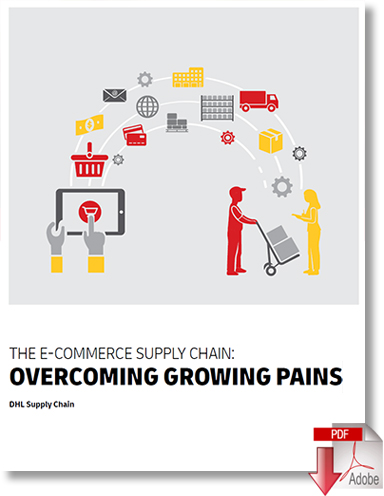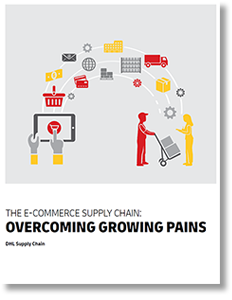A Deep Dive Into Shippers’ Ecommerce Strategies

A new DHL report, entitled “The ecommerce supply chain: Overcoming growing pains,” takes a deep dive into the intersection of the importance of ecommerce on customer retention and satisfaction, as well as the barriers to implementing a successful ecommerce supply chain strategy.
The Ecommerce Supply Chain: Overcoming Growing Pains
While the importance of a fluid ecommerce supply chain ostensibly becomes more important to B2B and B2C shippers by the day, a new report issued by DHL Supply Chain, a subsidiary of Deutsche Post DHL Group, points to how much more work truly needs to be done, in order for shippers’ ecommerce supply chains to meet both internal and external expectations.
The DHL report, entitled “The ecommerce supply chain: Overcoming growing pains,” takes a deep dive into the intersection of the importance of ecommerce on customer retention and satisfaction, as well as the barriers to implementing a successful e-commerce supply chain strategy.
Data for the report was based on feedback from roughly 900 decision makers for logistics or supply chain management or ecommerce in various sectors, including retail, consumer goods, life sciences, high tech, auto, engineering, and manufacturing.
One of the report’s primary findings is that 70% of B2C companies and 60% of B2C companies are focused on the full implementation of their respective ecommerce supply chain strategies, with 70% of total respondents viewing ecommerce at “very important” or “extremely important,” as it relates to volume and revenue.
What’s more, the report points out that 40% of surveyed B2B shippers and slightly more than 30% of B2C shippers feel their ecommerce supply chain strategies are fully implemented.
“An effective ecommerce strategy must be integrated into how a seller goes to market and interacts with its customers, impacting many aspects of its organization from marketing, inventory management, order processing, order fulfillment, customer service, and returns to name a few material areas,” said Jim Gehr, President, Retail. DHL Supply Chain.
“At DHL Supply Chain, we have the added advantage of two decades of experience in ecommerce order fulfillment, inventory management, and returns, which allows us to help our customers reduce the complexity of executing an omnichannel experience to its customers inclusive of ecommerce.”
In terms of the challenges, shippers face in implementing ecommerce supply chain strategies, the three main takeaways identified in the report were constantly-changing customer expectations, other urgent business priorities, and limitations in existing infrastructure.
Other barriers making the list included high costs, technology systems limiting execution, lack of resources, not having the right partners to help, not having the right strategy, and not yet being ready to make the full investment.
“It is important for all shippers to identify and work with partners who not only understand their businesses and the needs of their customers but who are also able to anticipate and adapt to change efficiently through data-driven insights, customer-focused associates and scalable resources,” noted Gehr.
Meeting customer expectations is commonly viewed as a cornerstone of a successful ecommerce strategy, and it was no exception in the report, with 57% of B2C respondents and 53% of B2B respondents viewing it as “extremely important.
The report explained that customers want and expect, a great, painless ecommerce/online purchase experience, on their terms, with perfect customer service and perfect customer experience.
Not surprisingly, it stated that when assuming price parity, shippers’ purchasing decisions are based on how well businesses meet customers’ demands, with past demands that in the past may have been viewed as inconceivable, like two-, one-, or same-day delivery, customization, real-time tracking, flexible omnichannel ordering, and receipt and return capabilities, being more commonplace today.
Other customer demands highlighted in the report included things like product delivery/portfolio, allowing multiple purchases or return channels, return process, technical product support, and free shipping.
Due to rapid growth and rising customer expectations, the report observed that companies often struggle with developing a supply chain that not only meets expectations but also can scale rapidly to provide the same or a better level of service as their business grows.
And it added that this can lead them to partner with a 3PL to boost their in-house capabilities and resources and also be able to scale up quickly and effectively in order to capitalize on ecommerce opportunities.
“Because of the complexity of ecommerce, many respondents (47%) are adopting (or planning to adopt) a hybrid insource/outsource strategy,” said Gehr.
“As part of this, many companies partner with a 3PL to help address the barriers they face on their way to profitable ecommerce growth.”
Related Article: Navigating Ecommerce with Your Existing Supply Chain Relationships & Capabilities
Related Ecommerce Resources
The Ecommerce Supply Chain: Overcoming Growing Pains
This report and survey captured the opinions and insights of nearly 900 decision-makers responsible for logistics and supply chain management and ecommerce distribution strategy across the globe. Download Now!
Ecommerce Logistics Leader Series
Co-written by Adrian Gonzalez and Mike Glodziak, this ecommerce logistics leader series describes how you can get to market faster, by leveraging your existing network, resources, and relationships to their fullest potential as well as how you can use logistics as a competitive weapon. Download Now!
More LEGACY Supply Chain Services Resources
Article Topics
DHL Supply Chain News & Resources
Orchestration: The Future of Supply Chain Port of Baltimore Could Reopen in May, Says DHL Executive DHL Express and Standard Chartered to Cut Carbon Emissions DHL Supply Chain Deploys Cobot to Optimize Picking Process Hitting the Right Notes in the Supply Chain Supply Chain Digitalization Trends for 2024 and Beyond DHL Supply Chain and AutoStore announce partnership expansion More DHL Supply ChainLatest in Supply Chain
U.S. Manufacturing is Growing but Employment Not Keeping Pace The Two Most Important Factors in Last-Mile Delivery Most Companies Unprepared For Supply Chain Emergency Microsoft Unveils New AI Innovations For Warehouses Let’s Spend Five Minutes Talking About ... Malaysia Baltimore Bridge Collapse: Impact on Freight Navigating TIm Cook Says Apple Plans to Increase Investments in Vietnam More Supply ChainAbout the Author

















